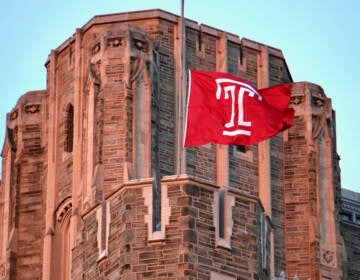Temple to begin contract negotiations with faculty union TAUP
TAUP represents a total of 2,350 full and part-time faculty members, librarians, and academic professionals at 13 out of 17 Temple schools and colleges.

Temple University in North Philadelphia. (Mark Henninger/Imagic Digital)
This story originally appeared on The Philadelphia Tribune.
Temple University representatives will begin to negotiate a new contract with the Temple Association of University Professionals (TAUP) this week. The faculty union’s current agreement will end Oct. 15.
Temple previously offered an 18-month month extension to the current agreement, but TAUP declined the university’s offer. The extension proposed by Temple would have provided TAUP members with guaranteed salary increases starting July 1 and kept benefits steady.
TAUP represents a total of 2,350 full and part-time faculty members, librarians, and academic professionals at 13 out of 17 Temple schools and colleges.
“It is true that Temple is facing some challenges, many of which have been previously documented,” said Temple University acting president JoAnne A. Epps in an email to students, faculty, and staff. “It is also true that both Temple’s administration and TAUP may have different perspectives on exactly what the university’s approach should be in overcoming these challenges.
“TAUP and the university have a shared goal, which is to enable our outstanding faculty, librarians and academic professionals to continue providing students with the excellent education that is a hallmark of Temple University,” she said.
“I am confident that negotiations for the university and TAUP will continue to work in the spirit of cooperation, with an earnest focus on reaching a fair agreement that benefits both parties. More than anything else, our students’ best interests will always be a top priority.”
According to Temple officials, the university will begin the fiscal year with a projected $90 million budget deficit due to inflation, a decrease in enrollment and the uncertainty of the Commonwealth appropriation. Two-thirds of that shortfall has since been reduced with the elimination of 140 staff vacancies.
Temple is also among four Pennsylvania state-related universities that receive more than $600 million in annual state appropriations.
The entirety of the university’s state appropriations go toward in-state tuition discounts for Pennsylvania students. Temple uses their own funds every year to double that discount.
However, legislation has yet to be finalized to allow discounted tuition for in-state students at Temple, Lincoln University, Penn State and the University of Pittsburgh.
Last month, Temple’s Board of Trustees approved a 4.2% increase for in-state students and a 4.4% increase for out-of-state students. The increase comes after the university has held tuition flat during two of the past four years.
In-state students will pay a base tuition of $17,979 for the 2023-2024 school year, while out-of-state students will pay $32,376.
Temple officials said one of the key factors that will play a role in negotiations with TAUP will be the university’s operating budget, which is driven by tuition revenue.
“Compensation and benefits make up approximately 65% to 70% of our overall operating budget,” said Temple’s chief operating officer Ken Kaiser in a statement.
“We know it’s important to pay our employees competitively, and the fact that salaries make up such a high percentage of our budget serves as evidence of that,” he said. “We’re eager to work with TAUP to reach an agreement that benefits everyone but also sets Temple on a sustainable path moving forward.
“We’re thankful that we have a history of positive outcomes from negotiating with TAUP and all 11 unions here at Temple. We are ready to get to work to reach a mutually beneficial agreement before TAUP’s contract ends in October. We are prepared to meet as frequently as needed between now and then to get this done for our students and the entire Temple community.”

Get daily updates from WHYY News!
WHYY is your source for fact-based, in-depth journalism and information. As a nonprofit organization, we rely on financial support from readers like you. Please give today.





